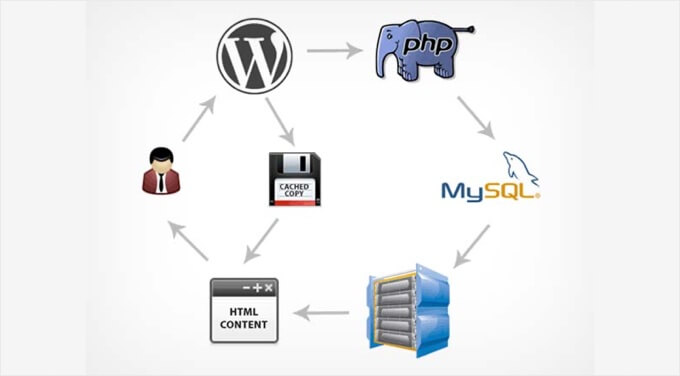Understanding MySQL: The Backbone of WordPress
MySQL is a popular open-source relational database management system (RDBMS) that plays a critical role in powering various web applications and platforms. One prominent example of MySQL’s utilization is in the WordPress content management system (CMS). In this blog post, we’ll explore what MySQL is and delve into how WordPress leverages its capabilities to provide a robust and scalable platform for website creation and management.
What Is MySQL?
MySQL is an open-source RDBMS that enables the storage, organization, and retrieval of structured data. Developed by Oracle Corporation, MySQL is known for its speed, reliability, and flexibility. It adheres to the SQL (Structured Query Language) standard and supports a wide range of operating systems, making it a versatile choice for database management.
How WordPress Uses MySQL
WordPress, the world’s most popular CMS, relies heavily on MySQL as its primary database management system. Here are the key ways in which WordPress utilizes MySQL:
Data Storage
MySQL serves as the storage engine for WordPress, storing all the website’s content, including posts, pages, comments, user information, and plugin settings. Each piece of content is stored in a specific table within the database, allowing for efficient retrieval and manipulation.
Dynamic Content Retrieval
WordPress employs MySQL’s querying capabilities to retrieve dynamic content from the database. When a user requests a webpage, WordPress constructs SQL queries that fetch the required data from the appropriate MySQL tables. This enables WordPress to display up-to-date and personalized content to website visitors.
Database Structure and Relationships
MySQL enables WordPress to define the database structure and establish relationships between different tables. The database schema in MySQL determines how data is organized and related within WordPress. This structured approach allows for efficient data management and retrieval, improving overall performance.
Plugin and Theme Integration
WordPress’s extensibility is one of its key strengths, and MySQL plays a crucial role in integrating plugins and themes seamlessly. Plugins and themes often require additional database tables to store their specific data. MySQL enables these extensions to create and manage their tables within the WordPress database, providing the necessary functionality and customization options.
Performance Optimization
MySQL offers various optimization techniques that WordPress can leverage to improve performance. WordPress can utilize indexes, caching mechanisms, query optimization, and database tuning techniques provided by MySQL to ensure fast and efficient data retrieval. These optimizations help enhance the overall speed and responsiveness of WordPress websites.
Unveiling the Secret: Why Java’s Spring Framework Continues to Reign as the Go-To Choice
Scalability
MySQL’s scalability features make it suitable for handling websites of varying sizes. WordPress websites can experience exponential growth, and MySQL’s ability to handle large datasets and efficiently execute complex queries allows WordPress to scale seamlessly. With MySQL, WordPress can accommodate increased traffic and data demands as websites expand.
User Management
MySQL is instrumental in handling user management within WordPress. It stores user information such as usernames, passwords, email addresses, and roles. WordPress utilizes MySQL’s authentication and authorization mechanisms to verify user credentials, control access to the admin panel, and enforce user-specific permissions.
Content Relationships
WordPress often involves content relationships, such as linking posts to categories or associating posts with tags. MySQL’s ability to define and manage relationships through foreign key constraints allows WordPress to establish these connections efficiently. This relationship management ensures content organization, facilitates navigation, and enhances the user experience.
Content Search and Sorting
WordPress websites often provide search functionality and the ability to sort content based on various criteria. MySQL’s powerful querying capabilities enable WordPress to perform complex searches and sorting operations quickly. By leveraging MySQL’s indexing and search features, WordPress delivers accurate and relevant results to users, enhancing usability and content discoverability.
Backup and Recovery
MySQL’s support for data backup and recovery plays a crucial role in safeguarding WordPress websites. WordPress administrators can utilize MySQL’s backup tools, such as mysqldump or third-party solutions, to create regular database backups. These backups provide an essential safety net, allowing website owners to restore their WordPress sites in case of data loss, system failures, or security breaches.
Data Replication and High Availability
For larger WordPress installations and enterprise-level deployments, MySQL offers features like data replication and high availability solutions. Replication enables the creation of multiple copies of the database, ensuring redundancy and improving fault tolerance. MySQL’s high availability options, such as master-slave replication or clustering, enable WordPress to handle increased traffic, minimize downtime, and provide seamless user experiences.
Database Performance Monitoring
MySQL provides comprehensive monitoring and performance analysis tools that can be leveraged by WordPress administrators. Monitoring tools like MySQL’s Performance Schema and query profiling utilities allow WordPress site owners to identify bottlenecks, optimize slow queries, and fine-tune database performance. These monitoring capabilities help ensure that WordPress websites deliver optimal performance and responsiveness.
Seamless Updates and Maintenance
When WordPress releases new versions or security patches, MySQL’s compatibility and upgrade processes enable smooth updates and maintenance. WordPress developers ensure that database schema changes and migration scripts are compatible with MySQL, allowing WordPress users to seamlessly upgrade their installations without disrupting data integrity or functionality.
MySQL is a vital component in the WordPress ecosystem, providing a reliable and robust database management system. It serves as the backbone for storing and retrieving content, facilitating dynamic content generation, managing relationships, enabling plugin and theme integration, optimizing performance, and ensuring scalability. The seamless integration of MySQL with WordPress empowers users to create and manage websites that are flexible, efficient, and capable of handling diverse data requirements.

